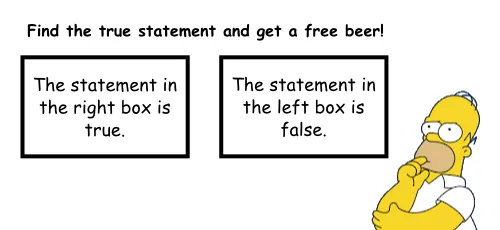The Liar's Paradox is perhaps the shortest sophism there is. In its most common form it fits in just four words:
This sentence is false.
Think about it: if the sentence is indeed false, then we should not believe its claim that "it is false", and must conclude that the sentence is, in fact, truthful. However if it is truthful, then we must believe its claim that it is false, and thus must conclude that it is false, returning back to where we started. It is an infinite loop!
The liar's paradox is the father of all logical sophisms. Despite its deceivingly compact form, it bears profound implications for various corners of logic, mathematics and computing. For example, its construction is mirrored in the Russel's paradox, which lies at the foundation of modern set and category theory (and thus, indirectly, all of modern mathematics).
The liar's paradox is also to blame for the existence of the halting problem and Rice's theorem. These two severely curb the ambitions of computer science by demonstrating that it is mathematically impossible to create an algorithm which could reliably detect any useful properties of other algorithms.
The paradox achieves full glory within the famous Gödel's First Incompleteness Theorem, which, in simple terms, claims that in any reasonably complex logical system (such as our mathematics) there will always exist statements which are impossible to either prove or disprove. A version of the "liar's paradox sentence" is essentially an example of such a statement.
The liar's paradox can be cast in many different forms. The one with the two boxes is among my favourites:

For other sophisms check out my other posts.